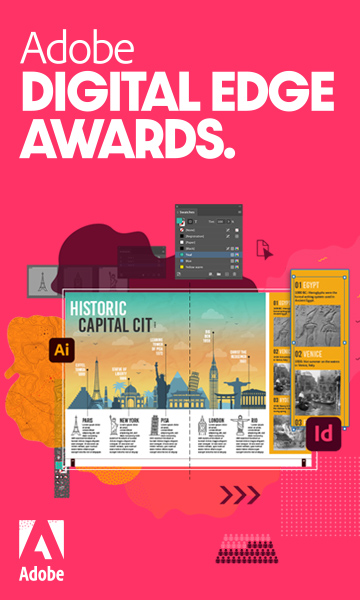
Adobe and Teesside University collaborated on a project-led workshop at Bett
Equipped with a smartphone and a floor plan, journalism and broadcast production students from Teesside University who attended Bett 2019 were tasked with creating 60-second documentaries about the future of education. The task, set and led by a group from the Adobe Education Leaders programme, was not an easy one. Students had only a few hours to shoot, edit and render their films, processing raw audio and video from their mobile devices on workstations at Adobe's exhibition stall. Using Adobe Premiere Rush, video-editing software that they were seeing for the first time earlier that day, it was a robust test of their abilities.
Watching closely was Dominic Dunn, technical director at Teesside. He says that digital skills are a priority for the university and that workshops such as Adobe’s consist of everyday exercises that help prepare students for the workplace. “Using this kind of app, they can do rough cuts and take them into the higher-end editing suites,” he explains. “There are so many different practical applications for using digital technology.”
Teesside’s commitment to boosting digital skills extends to its Advance programme, which issues eligible students with an iPad pre-loaded with software designed to maximise the student experience, a keyboard and credit towards textbooks. The students keep their iPads once they have completed their studies. By then Dunn hopes that they will have accumulated the broad range of skills that employers are looking for. “We make sure that we are providing our students with real-world, practical skills,” he says. “When they leave university they are connected in the right way, but they are also exposed to the relevant software, hardware and how to engineer that into producing stories and content.”
As the nature of many jobs continues to change rapidly in response to emerging technologies and channels of communication, employers from all sectors want workers with more advanced digital skills. Universities must determine how they update each programme of study to accommodate this. With augmented reality a particular boon to healthcare students, edtech is already transforming the entire learning experience at Teesside. Dunn sees no end to the opportunities for both Stem subjects and the humanities.
With 10 minutes until deadline, an animated zombie stares out of a vacant workstation running Adobe Character Animator. Luckily it is the only sign of dread. Alex Gay, Adobe’s director of product marketing for education, has seen what new users can do with these tools before. He cites Adobe’s Creative Jams – where it splits 120 higher education students into teams to compete in various aspects of design – as evidence that creativity is vital for maximising students’ potential. One student in Michigan found a new career path through Adobe XD, a prototyping user experience tool for web and mobile apps. “His major was completely unconnected,” says Gay. “But just by virtue of being interested in the tools he found his passion and it took him on to a great career.” That student is now a product manager at Ford.
“I see the technical skills that our tools provide as being a really valuable asset for students,” he adds. “You are looking at how you can communicate your content in a really impactful way for your audience and that’s a skill which will help you no matter what you go and do.”
He is endorsing immersive learning environments as 2pm arrives and it is time to screen the students’ films. Each one tells the same story but none are alike. Some are exuberant to-camera monologues, while others utilise interviews and graphics. Rebecca Carroll, whose film took home a prize, credits Teesside’s approach with giving her the focus to hit deadlines under pressure. “I’d never be able to do that a few years ago,” she says. It is one skill that will always be future-proof.
Find out more about Adobe’s solutions for higher education.



























